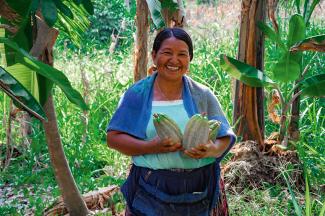Central America
Planting diverse crops, securing livelihoods

Many indigenous and smallholder communities in Central America feel that their livelihoods are threatened by predatory competition from industrial agriculture. Increasingly, priority must be placed on cultivating a few highly productive crops in place of their traditional varieties.
Other communities, on the other hand, live in such remote regions that they have no access to markets or financial capital. In order to support the rural population while simultaneously counteracting species loss, KfW has launched a regional programme on behalf of the German Federal Government with the aim of promoting agrobiodiversity in and through indigenous smallholder communities.
Example in Tacuba, El Salvador: The community is located on the edge of El Imposible National Park, the country’s largest and species-rich national park. Around 400 tree species, almost 300 different bird species, numerous mammals and hundreds of species of butterflies are found there. The population is largely indigenous and thrives on agriculture.
Smallholder families receive support from the regional “Agrobiodiversity in Central America” programme so that they can maintain their traditional production methods. “It’s about improving the nutritional situation while simultaneously preserving the diversity of their natural environment,” said Susanne Berghaus, Portfolio Manager. This preserves the gene pool, which is crucial for adapting to changing climatic conditions. This approach also increases balance within the ecosystem – which in turn contributes to climate change mitigation, as plants, forests and soil generate carbon sinks.
A total of 25,000 people in Belize, Costa Rica, El Salvador, Guatemala, Honduras and Panama benefit from the programme, which has three main objectives: to improve productivity on traditional farms, to further process and market their products and to disseminate knowledge about plants and traditional farming practices.
The Costa Rica-based non-governmental organisation ACICAFOC (Asociación Coordinadora Indígena y Campesina de Agroforestería Comunitaria Centroamericana) is implementing the programme for KfW. There is a lively exchange with the indigenous smallholders; the support ideas usually come from the local groups themselves.
A lot has happened in the community of Tacuba since the promotional activities began. Gardens for medicinal plants have been created as well as croplands for cassava, coffee and cocoa, and fruit trees with varieties such as papaya, loquat, avocado, guanábana or pigeon peas. Local vegetables such as Creole cucumber or spinach also grow there. The fact that everything blooms and sprouts is also due to a good dozen reservoirs for rain water, which were built with the help of the programme. The special thing about it is that farming activities take place within an agroforestry system; in other words, they are combined with trees or shrubs – this is important for climate change mitigation.
Almost 70 small-scale projects and communities are now part of the programme. The measures look a little different everywhere, but they have the same goal: to secure the livelihoods of the predominantly poor population by using traditional and sustainable farming practices. “This is good for people and for the environment – which means that people will ultimately benefit from it twice,” said Susanne Berghaus, describing the success of the programme.
Friederike Bauer












